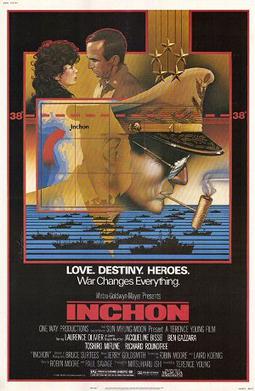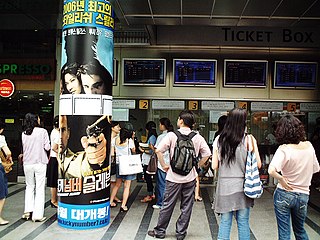
Inchon is a 1981 war film about the Battle of Inchon, considered to be the turning point of the Korean War. Directed by Terence Young and financed by Unification movement founder Sun Myung Moon, the film stars Laurence Olivier as General Douglas MacArthur, who led the United States' surprise amphibious landing at Incheon, South Korea in 1950, with Jacqueline Bisset, Ben Gazzara, Toshiro Mifune and Richard Roundtree.

South Korean films have been heavily influenced by such events and forces as the Korea under Japanese rule, the Korean War, government censorship, the business sector, globalization, and the democratization of South Korea.

Kang Soo-yeon was a South Korean actress. An internationally acclaimed star from the mid-1980s to the end of the 1990s, she is often honorifically nicknamed Korea's "first world star".

Jung is a Latin alphabet rendition of the Korean family name "정", also often spelled Jeong, Chung, Joung or Jong. As of the South Korean census of 2015, there were 2,407,601 people by this name in South Korea or 4.84% of the population. The Korean family name "정" is mainly derived from three homophonous hanja. 鄭 (2,151,879), 丁 (243,803) and 程 (11,683). The rest of the homophonous hanjas include: 政 (139), 桯 (41), 定 (29), 正 (22) and 情 (5).
This is a list of films by year produced in the country of South Korea which came into existence officially in September 1948. The lists of Korean films are divided by period for political reasons. For earlier films of united Korea see List of Korean films of 1919–1948. For the films of North Korea see List of North Korean films. For an A-Z list of films see Category:Korean films.

Come Come Come Upward is a 1989 South Korean film directed by Im Kwon-taek.
Running Man may refer to:

Shin Seong-il was a South Korean actor, film director, producer, and former politician. A legendary actor with 500 films in over 40 years, Shin debuted in director Shin Sang-ok's 1960 film A Romantic Papa and rose to fame through popular youth titles. A star in the 1960s and 1970s, his status as one of Korea's top actors extended well into the 1980s.

Park Joong-hoon is a South Korean actor.
Na Young-hee, born Bang Suk-hui, is a South Korean actress. Na was born in Boeun, North Chungcheong Province, South Korea.
Freezing Point is the debut novel of Japanese novelist Ayako Miura, first serialized on Asahi Shimbun between 1964 and 1965. The novel won Asahi Shimbun's Ten Million Yen Award.
This page is based on this
Wikipedia article Text is available under the
CC BY-SA 4.0 license; additional terms may apply.
Images, videos and audio are available under their respective licenses.









